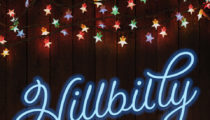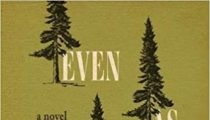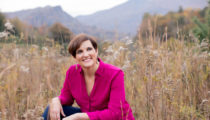Knox Thompson first crossed paths with the man who would…
Book Review: ‘Late Migrations’ by Margaret Renkl
Margaret Renkl. Late Migrations: A Natural History of Love and Loss. Minneapolis, Minn.: Milkweed Editions, 2019. 248 pages. Hardcover. $24.00.
Late Migrations arrived on a busy afternoon, and I took a moment to flip through it, so inviting was the artwork, the dust cover, the heft of the nice paper upon which it was printed. I read the first essay and then the next. I was rooted to the spot, unable to put it down; I read deep into the afternoon and until the light failed.
Late Migrations, Renkl’s book debut, is a work firmly rooted in memory and stories, contemplations and meditations on the author’s beginnings in Alabama. It is a book threaded through with observations of the natural world, the one found in red clay roads, creekbeds and suburban backyards. The collection carries the subtitle A Natural History of Love and Loss, giving the reader a glimpse into a childhood in a specific place, keen observations of the habits of bees, wolves, dogs, and especially birds, bundled together in a voice that is anchored in the here and how, the wise everyday, of someone who is paying attention.
The essays are short, some just a page, others shorter that. This bijou is presented with poetic brevity and from time to time she shares the stories passed down to her from her grandmother. These are written in italics, reminding us that the voice, the actual voice is stilled—but the memory lives in these pages.
Renkl, of course, has stories of her own to tell, and she does with clarity, honesty, and heart, reminding herself of our attachment to and alienation from the natural world. She writes movingly of homey things like chicken and dumplings, Christmas ham and the “beds that birthed babies.” She takes us on a creek walk with her younger brother, their feet hardened by a barefoot summer outdoors, showing us that creek and remembering how the subtle smell of decay wasn’t even worthy of curiosity then.
We visit her backyard in Nashville, where she now lives, and she shows us the bird feeders by every window and a white pine too close to the house—the one she forbids her husband to take down when he contemplates it because it reminds her of home. We know their yard is unruly compared to the neighbors’. But it sounds lovely, there in the middle of a large city, and we wonder—if we ourselves drove slowly and paid attention—if we might also catch a glimpse of wildness in the midst of urban life.
One theme of Late Migrations is the struggle of holding together both the wild and the tame, abundance and decay, the sorrow of loss and the joys of living. It is no easy feat, and Renkl reminds us of this over and over. “Again and again I have to teach myself the splendor of decay,” she writes in the essay “Farewell.” This, alone, is a superb sentence. But in Renkl’s deft hands it becomes something more, and so begins a meditation on the order of things, an essay truthful and hopeful, and complete in the span of a mere ninety-seven words.
That is the thing about these essays: there are over a hundred here and each one stands alone, complete and lovely. They remind us of ourselves, our parents in their prime and our parents in their leaving. We hear the howl of an old, beloved dog, that most faithful of family members, and we begin to grieve him before he leaves us, loving more fiercely what he once was and what he has become. We think about the bees and the clover Renkl plants and the incredulity of her neighbor who spends good money to get rid of it in her own yard. We linger every twenty pages or so over the beautiful artwork that graces the pages. (The muted, jewel-like drawings are the creations of her brother, Billy Renkl, a collage artist.)
While each essay stands on its own, taken together they create a moving and honest memoir, one with the central themes of nature, both wild and orderly, and the loss and grief of letting go, something she foreshadows in the epigraph she has chosen. It contains two quotes, the first from Arthur Miller’s Death of a Salesman: “Well, dear, life is a casting off. It’s always that way.” And then, from George Barker, “Therefore all poems are elegies.”
If this gives the impression that this book is morose or depressing, nothing could be more wrong. It is a mature book, to be sure, one that could only be written from the vantage point of a writer of a certain age. In an interview with novelist Silas House, Renkl was asked about her purpose for writing the book, what she most wants readers to get from it. She says she started writing about her own feelings of loss when her mother died suddenly of a cerebral hemorrhage. We live with much loneliness and homesickness and loss, she says, but in a time of quick fixes and glib reassurances, those things people say to us to minimize our pain or try to convince us that it will—or should—pass quickly. None of this is helpful, according to Renkl.
She says we have arrived at point in time when suffering is seen as an anomaly and joy the norm, thereby fueling the impetus to move quickly through and away from sadness and grief. This is a mistake, Renkl believes. The goal is to hold the two together, in acceptance and hope.
She began, then, to write about what she was feeling, thinking, in the hope that others might find it helpful, as writing it down was helpful to her. She speaks humbly of this, in the voice of a kind and trustworthy friend who would never presume but who stays close and quietly hands you tissues, or tea, or any of a hundred small things you might need in that moment.
This is Late Migrations. A hundred small essays, a thousand observations, a meditation on the wider world of nature as a way to inform the smaller spaces of the human heart. Renkl is a compassionate and wise companion, pointing out where to look, just there, under those branches, beneath that pine, under the mossy rocks of a stream. Her voice soft, kind, knowing. Her writing is smart and moving, yet clear-eyed and devoid of sentimentality, a tricky balance to strike when grappling with personal material.
I read Late Migrations in one sitting. I read it fast so I might turn to it again to savor it slowly. I have the lay of the land, having read it from start to finish, and now I dip in and out of it when I need to be reminded of something she has said, or when I need help listening to my own stories of loss and hope. It’s that kind of book. A wonderful read, beautifully crafted, and more, much, much more.



